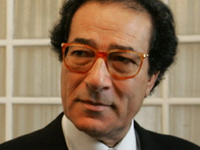Fateful Remarks Of Culture Minister Farouk Hosni
Clamor over unsuccessful fighr of Culture Minister Farouk Hosni to become the first Arab to lead the United Nations' cultural organization has not yet subsided.

The 71-year-old abstract painter and ally of President Hosni Mubarak had carried the hopes of an Arab world seeking cultural prominence and closer ties with the West. But Hosni's bid to become director-general of the U.N. Educational, Scientific and Cultural Organization unraveled in part because of comments he made in 2008 in which he told parliament he would personally burn any Israeli books in Egypt's Alexandria library.
A hurried public relations campaign by Hosni and the Egyptian government muted some criticism, and when the 58-member UNESCO board met last week, Hosni led in the first round of voting. But in subsequent rounds his early supporters abandoned him as the United States and key European countries backed Bulgarian candidate Irina Bokova, who won the post in Tuesday's fifth round by a vote of 31 to 27.
Upon his return to Cairo on Wednesday, Hosni told reporters at the airport:
"It was clear by the end of the competition that there was a conspiracy against me. There are a group of the world's Jews who had a major influence in the elections who were a serious threat to Egypt taking this position."
The rejection was such a sting to the national psyche that even the government's harshest critics rallied around Hosni. Ibrahim Issa, editor of the independent newspaper Al Dustour, wrote that "Hosni has the personal capabilities to be head of UNESCO. He fought many attempts aiming to defame him in the West, but it seems that Europe is still not ready to put its heritage in the hands of an Arab."
An enigmatic figure with big glasses and wispy black hair, Hosni can anger Muslims as easily as Jews. Some Egyptian women were upset with him for suggesting that the head scarf is a sign of going culturally backward. Writers and intellectuals have not always been pleased with the way he has presided for 22 years as culture minister in a nation criticized by human rights groups for censoring books and stifling free speech and political expression.
In recent weeks, Hosni apologized for his book-burning remark and his ministry announced that it would translate into Arabic novels by Israeli authors Amos Oz and David Grossman. The ministry also began restoration of the neglected Maimonides synagogue in Cairo's ancient Jewish quarter. By late August, it appeared that Hosni would win the UNESCO post.
But diplomatic maneuverings and scrutiny intensified over the weekend as accusations multiplied, including one from an Arabic-language website that alleged that in 1985, when Hosni was a cultural attache in Rome, he helped the Palestinian hijackers of the Achille Lauro cruise ship escape from Italy. The hijackers had killed a disabled American Jewish tourist aboard the ship.
"Farouk Hosni is the opposite of a man of peace, dialogue and culture; he is a dangerous man who inflames hearts and spirits," went an open letter signed in May by French filmmaker Claude Lanzmann, French philosopher Bernard-Henri Levy and American Nobel laureate Elie Wiesel. "We invite all countries dedicated to liberty and culture to take the initiatives necessary to avert this threat and avoid the disaster."
Zvi Mazel, former Israeli ambassador to Egypt, attempted to move Hosni's defeat beyond charges of anti-Semitism. He told Israeli radio:
"The world took a very interesting stand and in effect said that it is improper and inappropriate for a representative of a country like Egypt, a dictatorship that oppresses freedom and expression and art, to stand at the head of an organization entrusted with cultural cooperation and dedicated to promoting cultural dialogue."Reported by Los Angeles Times.
Subscribe to Pravda.Ru Telegram channel, Facebook, RSS!




